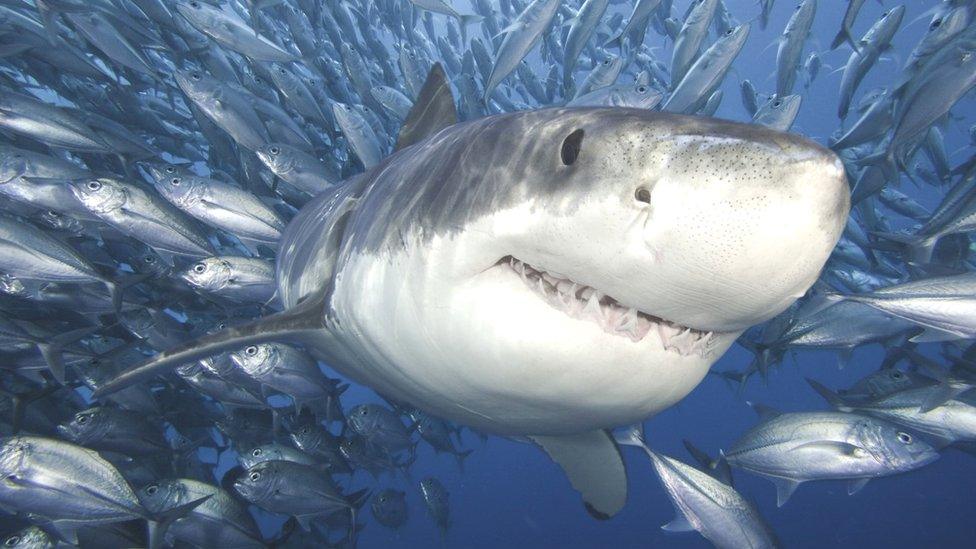The mums with eco-anxiety: 'I could cry all the time'
- Published
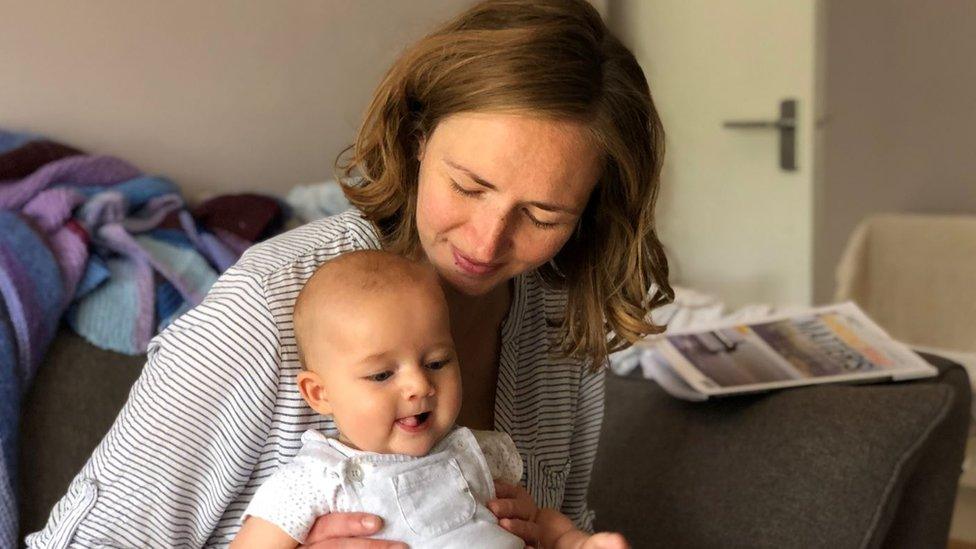
Heather Sarno says she feels "so guilty" for having brought her son into an uncertain world
Eco-anxiety is a recently popularised term to describe the overwhelming powerlessness some people say they experience when they think about climate change. For parents, such fears can be particularly acute. BBC News speaks to some of those affected.
'I couldn't sleep and my appetite went'
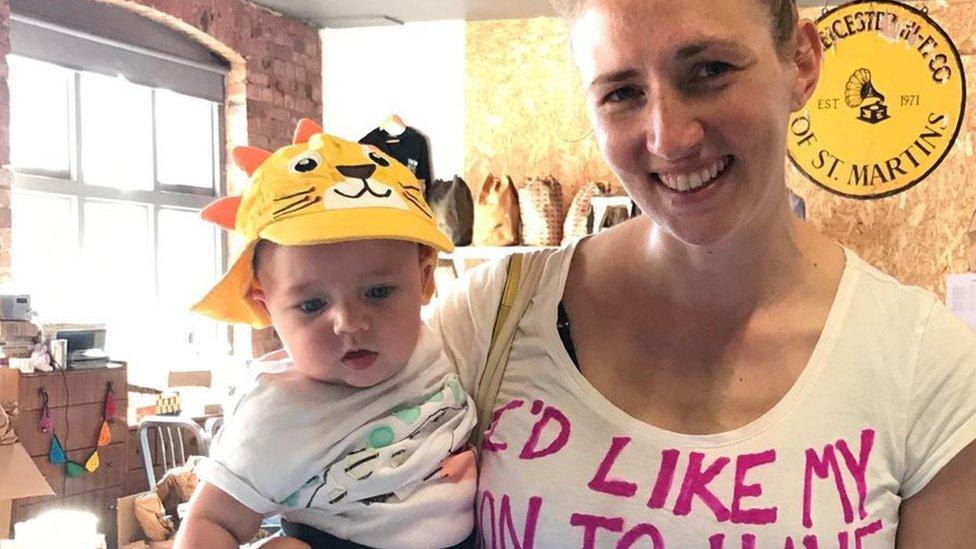
Heather Sarno takes four-month-old Jack along to Extinction Rebellion events
Like many new parents, Heather Sarno takes her son Jack along to rattle, rhyme and roll sessions at her local library. However, she broke down at a recent class because of her fears about the future of the planet.
"I was asking one of the staff members if I could speak to some of the other mums about coming to a climate strike," says Heather, from Beeston in Nottinghamshire. "She said they wouldn't be able to get involved in anything political and I got really, really upset. She said, 'I think you need to go and see someone'. But a doctor isn't going to prescribe me with what I want."
The 32-year-old mum of one says she wants an end to the damage humanity is inflicting on the planet.
She says the fact her fears are grounded upon scientific fact sets her anxieties apart from other psychological conditions or the usual fears that afflict new parents about their offspring's future, external. For starters, she says, there is no medical treatment for the eco-anxiety she is experiencing.
"A doctor wouldn't be able to control the companies responsible for 70% of the world's carbon emissions or put a stop to recreational flights," she says. "Only this morning, I was crying about it. It's like a grief process."
Having a child has exacerbated Heather's fears for the future. She says she only realised the impact of climate change after Jack's birth.
"It was terrifying - for days, I couldn't sleep. My appetite went. I cried loads. I felt really, really anxious and upset. I remember being really frantic and asking my husband, 'did you know about this?' I felt so guilty about having had Jack."

Baby Jack accompanies Heather at protests
So guilty did Heather feel, she has decided against having any more children.
"Jack is four months old. He's absolutely lovely. He's a dream baby, really," she says. "I can look at him and just burst into tears because I want him to have a nice life. I could definitely cry all the time but I've kind of made peace with the fact that if we carry on the way we are, he will die because of the effects of climate change.
"That's absolutely horrific but I have made peace with the fact that that is what will happen."
Heather channels her energy into activities for Extinction Rebellion, the protest movement that campaigns on climate change, which she recently joined. She takes Jack along to the meetings and says she has no concerns he will find such activities overwhelming.
"The atmosphere is actually really chilled," she says. "I don't want to pass on my anxiety until he's old enough to deal with it."

What is eco-anxiety?

A "massive public awakening" on climate change has brought eco-anxiety more into focus, experts say
The American Psychological Association describes eco-anxiety as "a chronic fear of environmental doom". According to the Climate Psychology Alliance (CPA), a not-for-profit organisation that aims to help people with eco-anxiety, the condition manifests itself in a number of ways - grief, rage, depression and hopelessness. "It's not a mental illness," said Caroline Hickman, a teaching fellow at the University of Bath and CPA executive. "If anything, it's a sign of good mental health because you are engaging with what's going on."
The CPA says eco-anxiety has been around for decades. However, a "massive public awakening" on climate change has brought it more into focus. "I would confidently say there are thousands suffering with this," Ms Hickman added.
Although anyone can have the condition, according to Ms Hickman it is "particularly acute" in parents. "Parents, of course, feel guilt and grief for their children," she said. "The parental instinct is to protect your children, and yet you can't protect them from this."
"It's a perfectly healthy response," added Ms Hickman. "Really, the cure is about some counselling, some psychotherapy and coming together with other like-minded people. The feeling that you are not alone is incredibly powerful."

'You need to feel the fear'
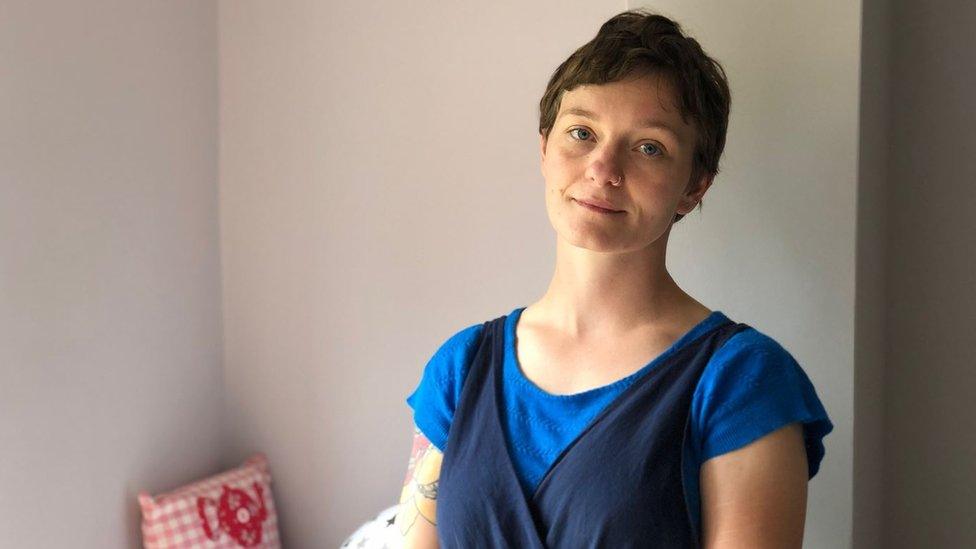
Lily Cameron says it's important environmental fear galvanises people into action
Like Heather, fellow mum Lily Cameron, joined Extinction Rebellion a few weeks ago and says listening to speeches by the likes of teenage environmental activist Greta Thunberg, makes her cry. She has an eight-year-old daughter, Jasmine, whom she takes to environmental gatherings.
"I don't want her to become anxious," she says. "For children, anxiety is more of a problem because they have so little control over their lives. Because of that, there are some things I wouldn't say to her."

Lily's daughter Jasmine comes to environmental protests
The 31-year-old mum, also from Beeston, has not sought medical treatment for her environmental fears.
"If you went to the doctor about eco-anxiety they would probably tell you to distract your mind or take these medications," she says. "It's not appropriate in this case. You need to feel the fear.
"I wake in the middle of the night and can't switch my brain off. I've always been quite eco-friendly but the anxiety has definitely got worse in the past few months. I've realised the things I'm doing are not going to be enough.
"The more you learn, the more fearful you feel but it's important that fear galvanises you into action. If you just feel the fear, you will be completely overwhelmed by it and not do anything."
'You are not alone'
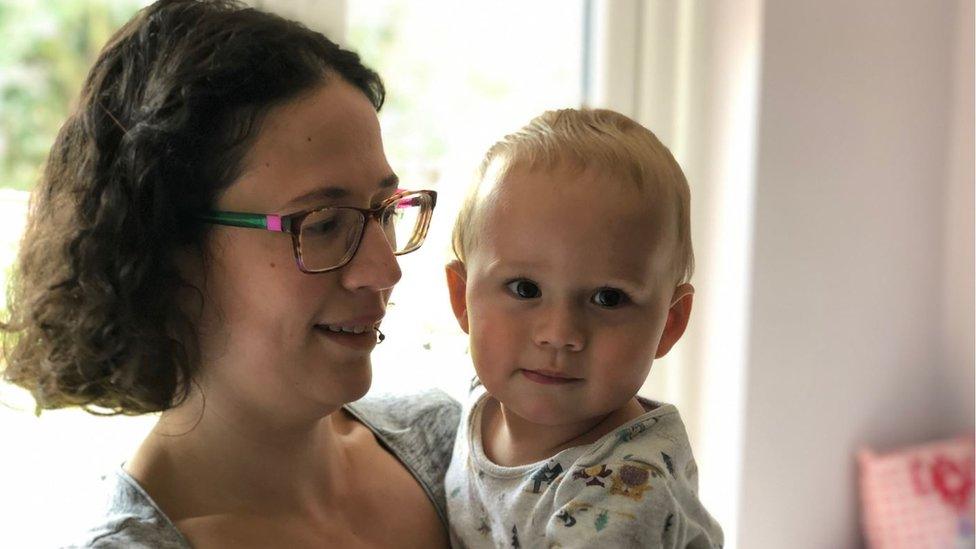
Heidi Jeffree says techniques she learned in counselling sessions helped her deal with the effects of eco-anxiety
Mum-of-two Heidi Jeffree, 31, from Forest Fields in Nottingham, says she has spells of shakiness and a shortness of breath when she considers the future of the planet. She also recently joined Extinction Rebellion and says forming such alliances made her feel "powerful".
"It shows you you are not alone," says Heidi, who is mum to Cassie, four, and Finch, one. "That's really helpful and calming."
Unlike Heather and Lily, Heidi has previously suffered from anxiety. In her 20s, she received counselling and "various medications".
"Therapy was massively helpful but I think anxiety is probably a facet of my personality," she says. "It's not necessarily a bad thing if you can manage it. And I can take the things I learned in therapy and apply them to this situation.
"For me personally, getting outside every day for fresh air and doing breathing exercises can help with the stress. It also helps to connect to other people."

Follow BBC East Midlands on Facebook, external, on Twitter, external, or on Instagram, external. Send your story ideas to eastmidsnews@bbc.co.uk, external.
- Published25 September 2019
